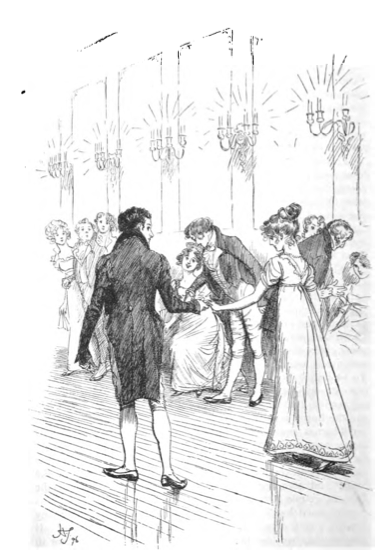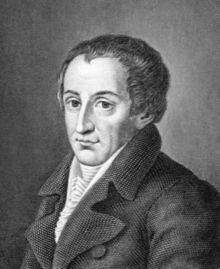Today is the last day of May, but it is not the end of Mansfield Park’s bicentennial year. This is a guest post by “Sophie” of A Reasonable Quantity of Butter. She is writing several more guest posts in celebration of Mansfield Park’s bicentennial, which will be posted throughout June. Also check out other continuing celebrations.
Each time I read Mansfield Park, I am disappointed that Fanny and Henry do not marry. Henry is charming and lively, and becomes down-right attractive when he starts to take life seriously. Fanny and he really seem to make a good couple. Austen took care that her readers would feel this way.
 The first glimpse of this is after the proposal, when the family is sitting in the drawing room after dinner. Henry reads aloud, and his reading is so compelling that all Fanny’s determination to ignore him fails her, and her eyes are fixed on him. “His acting had first taught Fanny the pleasure a play might give, and his reading brought all his acting before her again . . . with greater enjoyment.”1 Considering that Fanny’s pleasures in life were few, shared literary taste was a strong tie.
The first glimpse of this is after the proposal, when the family is sitting in the drawing room after dinner. Henry reads aloud, and his reading is so compelling that all Fanny’s determination to ignore him fails her, and her eyes are fixed on him. “His acting had first taught Fanny the pleasure a play might give, and his reading brought all his acting before her again . . . with greater enjoyment.”1 Considering that Fanny’s pleasures in life were few, shared literary taste was a strong tie.
Afterwards, when Fanny talks over Henry’s proposal with Edmund, he says, “[Henry] is lively, you are serious; but so much the better: his spirits will support yours.”2 Although the remark stems from Edmund’s infatuation with Mary, we at once see the justice of it. Fanny needs someone who can make her laugh and can help her stand up to the Aunt Norrises of the world. And Henry needs someone whose sobriety and stability could keep him from the errors of hasty action. Their temperaments complement each other.
In Portsmouth, Fanny discovers that Henry shares her love of nature: “They often stopt with the same sentiment and taste, . . . he was sufficiently open to the charms of nature, and very well able to express his admiration.”3 Fanny had often felt that others did not share her fascination, and that Edmund was her only companion in this, but in Henry she found another sympathizer.
While talking together, Henry points out to Fanny that they have a common interest in the poor. While her interest stems chiefly from compassion, his is steadied by a sense of justice and good management. “It was pleasing to hear him speak so properly; here he had been acting as he ought to do. To be the friend of the poor and the oppressed! Nothing could be more grateful to her . . .”4
Henry also shows during his visit to Portsmouth that he would work well with Fanny’s family. He respects them even when they are not respectable, and shows an instinctive delicacy towards Fanny’s feelings regarding them. When he is gone, Fanny reflects how much she would like to be able to invite her sister to live with her, and she “could fancy his entering into a plan of that sort most pleasantly.”5
Paradoxically, Austen takes as many pains before Henry’s proposal to prove that Fanny and Henry were ill-suited, as she takes afterward to prove them well-suited. And then she turns and destroys the castle in the air that she was building.
* * *
1Chapter XXXIV
2Chapter XXX, I am not suggesting that spouses are morally responsible for the actions of each other, only that good couples are better together than apart. Good couples grow together in great part by helping each other grow.
3Chapter XLI
4Ibid.
5Chapter XLIV






